

Activities. School Library Websites. Classification. Flipgrid. Tandfonline. Research Skills: Working towards the IB ATLs - Journeys Through Teaching. As mentioned in an earlier post Mark and I have been working on ways to build a community of researchers in school.
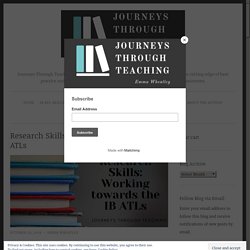
We’re excited to be presenting about this at the upcoming IB Global Conference in Abu Dhabi. Before we could begin thinking about what this might look like in the classroom, we identified a struggle many teachers were having with the ATLs. Even after reading the guidance in From Principles to Practice on the subskills that make up Research Skills, and some great work from educators such as Suzanne Kitto who shared great graphic breakdowns online, teachers still didn’t feel confident that they knew which skills within these approaches to learning they were aiming to teach.
Meet the Single Point Rubric. 6 Reasons to Try a Single-Point Rubric. As educators, we know the power of a good rubric. Well-crafted rubrics facilitate clear and meaningful communication with our students and help keep us accountable and consistent in our grading. They’re important and meaningful classroom tools. Usually when we talk about rubrics, we’re referring to either a holistic or an analytic rubric, even if we aren’t entirely familiar with those terms. A holistic rubric breaks an assignment down into general levels at which a student can perform, assigning an overall grade for each level. For example, a holistic rubric might describe an A essay using the following criteria: “The essay has a clear, creative thesis statement and a consistent overall argument. Why Single-Point Rubrics Are Awesome And 4 Ways To Use Them. Feedback is one of the best ways to support student learning.
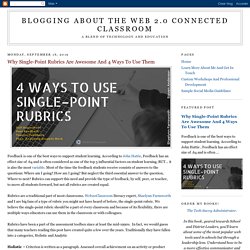
According to John Hattie, Feedback has an effect size of .64 and is often considered as one of the top 5 influential factors on student learning, BUT… it is also the most variable. Most of the time the feedback students receive consists of answers to the questions: Where am I going? How am I going? But neglect the third essential answer to the question, Where to next? Rubrics can support this need and provide the type of feedback, by self, peer, or teacher, to move all students forward, but not all rubrics are created equal. Rubrics are a traditional part of most classrooms. Rubrics have been a part of the assessment toolbox since at least the mid-1990s. 'One big virtual love-in': how children's book authors are creating online sanctuaries.
The children’s author and illustrator wunderkind Oliver Jeffers has started a stay-at-home story time where he reads a book a day live on Instagram.
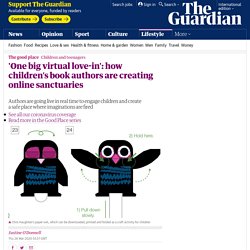
And they are pure magic. Jeffers, in quarantine in Belfast, is reading a story a day, having started with his first ever book How to Catch a Star. According to Jeffers, “[This is] for all you folks stuck at home in the coming weeks due to Covid, I will be reading one of my books every weekday, and talking about some of the things that went into making it. We are all at home, but none of us are alone. If a novel was good, would you care if it was created by artificial intelligence? Roland Barthes was speaking metaphorically when he suggested in 1967 that “the birth of the reader must be ransomed by the death of the author”.
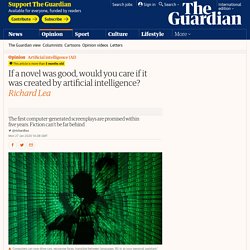
But as artificial intelligence takes its first steps in fiction writing, it seems technology may one day start to make Barthes’ metaphor all too real. AI is still some way off writing a coherent novel, as surreal experiments with Harry Potter show, but the future isn’t so far away in Hollywood. Breakout.edu Library Orientation. As I begin my 20th year in a school library, I find myself more excited about my job than ever and the possibilities for students to take charge of their own learning.
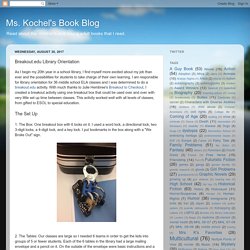
I am responsible for library orientation for 36 middle school ELA classes and I was determined to do a breakout.edu activity. ASLA CONFERENCE 2019- KEYNOTE: Dr Margaret K Merga. The Bloom's Taxonomy Verbs Poster for Teachers. When using Bloom’s Digital Taxonomy, it helps to have a list of verbs to know what actions define each stage of the taxonomy.
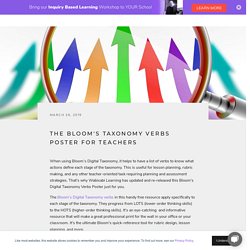
This is useful for lesson planning, rubric making, and any other teacher-oriented task requiring planning and assessment strategies. That's why Wabisabi Learning has updated and re-released this Bloom's Digital Taxonomy Verbs Poster just for you. The Bloom’s Digital Taxonomy verbs in this handy free resource apply specifically to each stage of the taxonomy. They progress from LOTS (lower-order thinking skills) to the HOTS (higher-order thinking skills). It's an eye-catching and informative resource that will make a great professional print for the wall in your office or your classroom.
Bloom’s Revised Taxonomy describes many traditional classroom practices, behaviours and actions, but doesn't necessarily account for the new processes and actions associated with newer emerging education technologies. Author Interview With Donalyn Miller: 'Reading in the Wild' As I was reading about - and looking forward to - Donalyn Millers upcoming book (with co-author Colby Sharp), Game Changer!
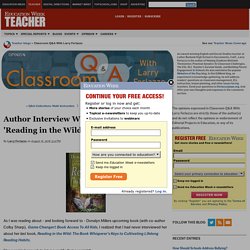
: Book Access To All Kids, I realized that I had never interviewed her about her last book, Reading in the Wild: The Book Whisperer's Keys to Cultivating Lifelong Reading Habits. She was kind enough to let me rectify that oversight! Donalyn Miller is an award-winning Texas teacher, author, and staff development leader. LF: You write about the importance of daily reading time in class for students. NPR Choice page. Information Literacy - Kathy Schrock's Guide to Everything - Info Literacy.
Phew! Finished! Write an annual report... Why? No way! Barrie's Bias Busters - MEDIA LITERACY WEEK - Education. Reading between the Lines: The truth about school libraries in a post-truth society – Linking Learning. This post includes content to support my recent teacher professional learning workshop, which I gave as a part of the St Rita’s Remarkable Women conference.
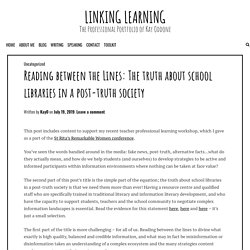
You’ve seen the words bandied around in the media: fake news, post-truth, alternative facts…what do they actually mean, and how do we help students (and ourselves) to develop strategies to be active and informed participants within information environments where nothing can be taken at face value? The second part of this post’s title is the simple part of the equation; the truth about school libraries in a post-truth society is that we need them more than ever!
Having a resource centre and qualified staff who are specifically trained in traditional literacy and information literacy development, and who have the capacity to support students, teachers and the school community to negotiate complex information landscapes is essential. If you missed the #aisict19 tour with @savery_mark and @dan_pearson of Emmanuel College... here’s a couple of pictures. Our new display showcases a story that needs to be read & shared by all, #EverythingIveNeverSaid by @SamWheelz. Our Year 7 English classes are looking forward to meeting Sam next week & learning more about her book, her writing & her story. @U. Information Literacy: Richer Through Collaboration. The School Librarian: Your Ultimate Digital Resource. Teacher brings literature to life for teenage girls. Why Kids Stop Reading For Fun By Age 9 (and What To Do About It)
Literacy in the Digital Age - Kathy Schrock's Guide to Everything. I have identified thirteen literacies that our students need to become well-rounded 21st-century citizens. These literacies are not taught as separate literacies but are taught across the content areas. If you find a link that is not working, please let me know the title and I will fix it! Thank you! There is a new book out, Developing Digital Literacies, by Dustin Summey. He presents a well-crafted, technology professional development model that is sound in practice, adaptable, and can be easily implemented at the local level.
Search results for: libraries. Class best books - windows to reading #v5UserConf2019 Great idea!… 10 Next Reads for Kids Who Love Raina Telgemeier. On a recent bookshop visit with a friend and her very cute niece, said niece was angling hard for an innocuous-looking illustrated novel. “Eh, this looks okay, but why don’t you get a real book?” Said my friend. Erica McWilliam - An Excellent Platform for Immersive Digital Storytelling with Students. How Your Teacher-Librarian Can Be An Ally When Teaching With Inquiry. Teacher-Librarians Have More Flexible Schedules The librarian’s schedule and workday provide more flexibility so they can be available to help teachers.
The door is open, why not come in? Also, it is my experience that teacher-librarians love having discussions with teaching colleagues–they get to play an active role in student progress and success. I have often stopped by the library unannounced, with the intention of just asking a quick question. Library Websites - Advocacy, Promotion, Teaching - Google Slides. Never Stop Reading! - The Department of Education. Reading is a fundamental skill your child will use for the rest of their life – so why stop when they’re just getting started?
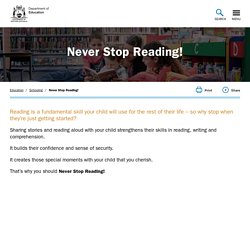
Sharing stories and reading aloud with your child strengthens their skills in reading, writing and comprehension. It builds their confidence and sense of security. It creates those special moments with your child that you cherish. That’s why you should Never Stop Reading! Teaching Students to Paraphrase. When discussing text in the classroom, it’s tough for students to shift from utilizing an author’s words (copying) to accepting the challenge to express that author’s idea in their own words (paraphrasing).
But teaching effective paraphrasing is necessary because the use of paraphrasing facilitates important literacy skills: It encourages repeated reading, develops note-taking habits as students track quotes and outline text details, and expands vocabulary as they consider appropriate ways to describe the original text. The skill may seem daunting to students because it takes time to find the appropriate words to reshape a sentence, but that is time well spent. We also need to teach paraphrasing, of course, so that students develop the skill set required to avoid committing plagiarism unintentionally. Student Tools. Putting an End to Fake Reading.
All English teachers want their students to develop a love of reading, but this is anything but a simple endeavor. Although I used to give students time to read once a week in my English classes for several years, I always knew I wasn’t making the impact I was aiming for. After a few years, I was able to get the whole class to be silent during the reading period, but I realized that not all of the students were actually reading—and that my reading program was anything but a success. School libraries as incubators – where good ideas hatch! Innovative School Libraries. The School Library: A Place for Innovation – Jane Cowell. I followed with interest the 2017 Australian Library Design Awards and was encouraged to see the quality of the School Libraries that were nominated for the Awards.
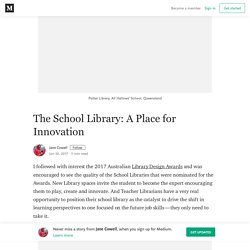
New Library spaces invite the student to become the expert encouraging them to play, create and innovate. For Teachers. Infoskills. UNESCO launch Five Laws of Media and Information Literacy – Information Literacy Website. UNESCO (United Nations Educational, Scientific and Cultural Organisation) have launched their Five Laws of Media and Information Literacy. Their strategy aims to bring together the fields of information literacy and media literacy into a combined set of knowledge, skills and attitudes required for living and working in the 21st century.
Media and Information Literacy recognizes the primary role of information and media in our everyday lives. EdWebet94 - SEL. Whitepaper School libraries share ideas for collaboration. Inspire Collaboration: A Quick and Easy Guide for Super Busy School Librarians. By Sarah Deringer, Head Editor, INALJ Mississippi. Bookstagram for beginners. Tips & Advice by The Bibliotheque. - The Bibliotheque. During the last few weeks I have been getting more and more messages asking me for bookstagram tips and advice. The Ultimate Bookstagram Guide: 12 Bookstagrammers' tips for success — Page Anchor. Disclaimer: The estimated read time for this article is 30min. Want to save this guide for later? 9 Ways Oliver v5 can help boost student engagement in the library – Softlink. Ifla guidelines en. Statement on Information Literacy. Anz info lit policy. Girls Develop their Voices. In 2018 a group of avid readers with a common passion for creating equality in the publishing industry came together to establish the Stella Book Club at Melbourne Girls Grammar.
Integral to this club is the partnership that the girls established with Stella, the organisation that manages the Stella Prize, a prize aiming to promote female Australian authors. This student run platform provides our girls with the opportunity to engage with Australian female authors as well as texts longlisted for the Stella Prize. Through this club, not only do our girls broaden their reading pool and share their views on issues raised by the authors, they also have the opportunity to meet remarkable Australian authors. In the Stella Club’s inaugural year, our girls were fortunate to meet contemporary and influential female Australian authors including Heather Rose, Cate Kennedy, Maxine Beneba Clarke and Sofie Laguna.